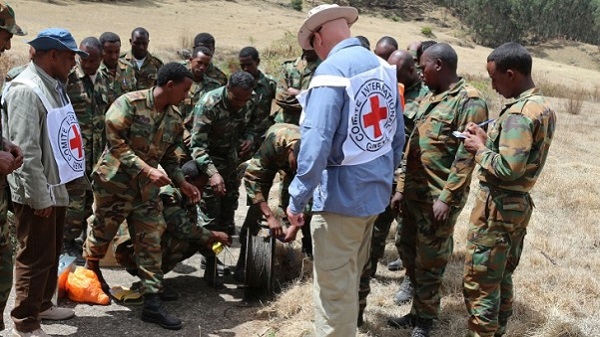
Explosive ordnance disposal (EOD), the procedure that renders explosive material safe, evokes images of wires, explosives, protective equipment and delicate procedures. Real-life training for such potentially deadly situations is crucial for the safety of people who clear mines.
The International Committee of the Red Cross (ICRC) and Ethiopia National Defense Forces (ENDF) provided EOD training for staff from the ENDF’s demining units in March at military facilities in Entoto and the Awash Military Areba Training Camp.
Twenty-three mine action staff took part in four weeks of training during which they reviewed basic skills, tried new equipment and carried out practical training.
“Considering our line of work, EOD teams have to act professionally and competently 100 percent of the time. It’s a job with no room for error,” said the ICRC’s Regional Weapon Contamination Advisor for Africa, John Sorbo. “If handled incorrectly, explosive materials could easily take a life. Now, due to the training and experience provided by ICRC the students can take these deadly munitions or land mines and dispose of them in a safe manner.”
Disposal of ordnance on the ground calls for practical experience, the sharing of knowledge and well established operational procedures. Since EOD personnel in Ethiopia cannot practice on every type of explosive device in existence, it is essential that EOD personnel share knowledge and experience with others in order to properly dispose of an item when they come across it, said Sorbo.
During the training, the students also watched the detonations of unexploded ordnance from inside a shelter at a safe distance approximately 500 meters away.
“Participating in EOD training provided allows us to interact with other weapon contamination colleagues and exchange information and experience. It also provides us with an opportunity to work on safe procedures and to work together and learn from more experienced colleagues,” said Colonel Tadege Yehwala from ENDF.
To stay current as an EOD operator, practitioners must pass international requirements every year.
Separately, the ICRC’s African Union delegation organized an event for International Day for Mine Awareness and Assistance in Mine Action on April 4th. With support from EMD, the Ethiopian National Defence Force Explosive Ordnance Disposal team carried out a demonstration at the “scene” of a recently-discovered unexploded land mine. The team liaised with the village chief, established a cordon, assessed the item and illustrated the correct procedures for destruction in place.
Source: ICRC
——
Other stories:
- Japan Extends Support to Ethiopian Peace Support Training Center
- Ethiopian National Public Health Training Center Officially Inaugurated
- ICRC: Joint Production of a Police Training Video for the Ethiopian Police
- University of Gondar, Gates Foundation, et al. Hold International Training
- Norwegian Support for Dental Health Service and Training Department in Addis Ababa University

Hi. Im a Zimbabwean civilian with no training in E.O.D. However , I would like to train as an E.O.D or U.X.O clearance technician. Is this possible?